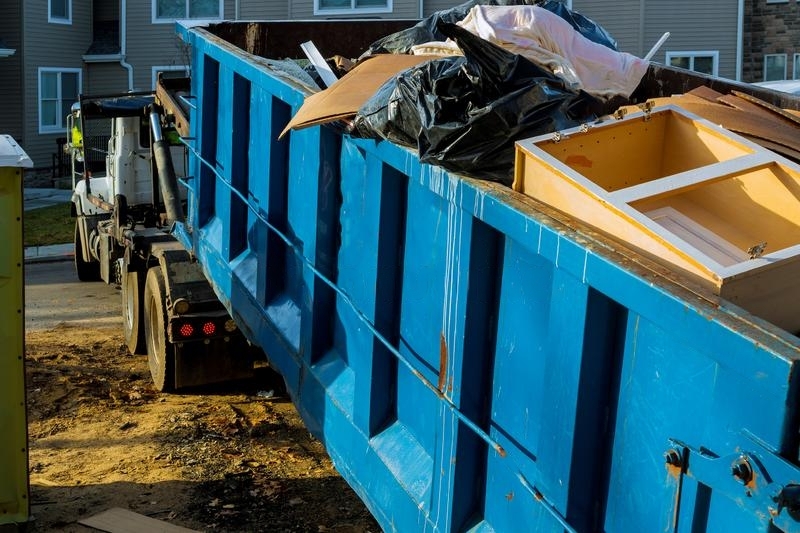Lowest prices in Cincinnati with no hidden fees.
Get a free consultation, call us now at: 513-854-7408.
Friendly junk removal expert customer service staff.
We always deliver and pickup fast and on time.
We are a local family business in Cincinnati, OH.
Construction and demolition waste (C&D waste) is the largest waste stream in the world, accounting for up to 40% of all waste generated globally. Recycling construction materials is becoming more and more important to reduce the impact on the environment and decrease the amount of waste sent to landfills.

Can construction materials be recycled?
Yes, many construction materials can be recycled. Concrete, asphalt, metals, wood, and masonry are all examples of materials that can be recycled. The recycling process varies depending on the material, but typically involves breaking down the material into its original components and using those components to create new products.
For example, concrete can be crushed and used as aggregate in new concrete or as a base material for roads and sidewalks. Similarly, asphalt can be recycled and used in new asphalt pavement. Metals such as steel and aluminum can be melted down and used to make new products. Wood can be ground into mulch or used in the production of new wood products. Masonry materials can be crushed and used as aggregate in new construction.
Benefits of Recycling Construction Materials
Recycling construction materials has many benefits, both for the environment and for the economy. Here are some of the key benefits:
Reduces landfill waste
Recycling construction materials reduces the amount of waste sent to landfills, which helps extend the life of these facilities and reduces the amount of new land that needs to be developed for waste disposal.
Conserves natural resources
Recycling construction materials reduces the demand for new resources, such as virgin materials, and helps to conserve natural resources such as timber, water, and energy.
Reduces greenhouse gas emissions
The production of new construction materials is often energy-intensive and emits greenhouse gases. By recycling materials, energy is saved, and greenhouse gas emissions are reduced.
Supports the local economy.
Recycling construction materials can create jobs in the local community, particularly in the recycling and manufacturing industries.
Saves money
Recycling construction materials can be less expensive than disposing of waste in a landfill, particularly if the cost of landfill fees is high.
Challenges to Recycling Construction Materials
Despite the many benefits of recycling construction materials, there are also challenges that must be addressed. Here are some of the key challenges:
Contamination
Construction materials can be contaminated with hazardous materials such as lead, asbestos, and mercury. Proper handling and disposal of these materials are critical to preventing harm to human health and the environment.
Lack of infrastructure
Recycling construction materials requires specialized equipment and facilities, which may not be readily available in all communities. This can make it difficult and expensive to recycle certain materials.
Limited markets
Some recycled construction materials may not have a strong market demand, which can make it difficult to sell these materials and create a viable recycling program.
Limited awareness
Many contractors and builders are not aware of the benefits of recycling construction materials and may not make an effort to recycle these materials.
Solutions for Recycling Construction Materials
Despite the challenges, there are many solutions for recycling construction materials. Here are some of the key solutions:
Education and awareness
Educating contractors, builders, and the general public about the benefits of recycling construction materials is critical to increasing recycling rates.
Regulation and enforcement
Governments can regulate the handling and disposal of hazardous construction materials to prevent contamination and enforce penalties for non-compliance.
Investment in infrastructure
Investing in specialized equipment and facilities for recycling construction materials can help create a robust recycling industry.
Collaboration
Collaboration between the construction industry, government, and recycling industry can help identify and address challenges and create solutions for recycling construction materials.
Recycling construction materials is essential to reduce the impact of construction and demolition waste on the environment and conserve natural resources. While there are challenges to recycling construction materials, such as contamination and limited markets, there are also many benefits, including reduced landfill waste, conserved natural resources, and reduced greenhouse gas emissions.
To increase recycling rates, education and awareness, regulation and enforcement, investment in infrastructure, and collaboration between stakeholders are all important solutions. By working together, we can create a sustainable and environmentally friendly construction industry that benefits both the economy and the planet.
Recycling construction materials does come with challenges, such as contamination and limited markets. To address these challenges, solutions such as education and awareness, regulation and enforcement, investment in infrastructure, and collaboration are essential.
At Cincinnati Dumpster Rental Whiz, we are committed to promoting sustainable practices in the construction industry, and we offer a range of dumpster rental services to support recycling and waste reduction efforts. Our team is knowledgeable and experienced in handling construction waste, and we can help you find the right dumpster rental solution for your needs.
Lowest prices in Cincinnati with no hidden fees.
Get a free consultation, call us now at: 513-854-7408.
Friendly junk removal expert customer service staff.
We always deliver and pickup fast and on time.
We are a local family business in Cincinnati, OH.
